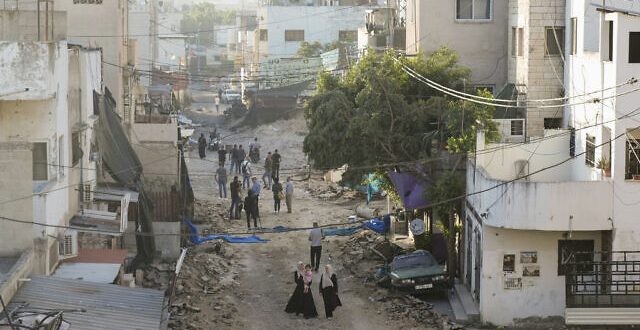Quoth BBC journalist Anjana Gadgil, “Israeli forces are happy to kill children.”
Said Amr Khamour, 14, “I wished for martyrdom and I received it.”
If Israelis are indeed “happy to kill children,” they have an all-too-willing market out there.
Of 12 Palestinians killed in Israel’s in Jenin the other week, at least four were under 18, the Palestinian Health Ministry said, according to The New York Times. Terrorist groups claimed that at least five of those killed were fighters, including a 16-year-old boy. Israel said that all Palestinian fatalities were combatants.
Amr Khamour was shot twice by Israeli soldiers last January when he died as he tossed stones at a military jeep at Dheisheh Camp in the West Bank.
Martrydom is intertwined with the Arab wars against Israel, and a New York Times piece headlined “West Bank Teenagers Write Their Last Words” affirmed the participation of Palestinian youths in scuffles with Israeli troops. The July 6 article reports on how farewell messages of Arab martyrs are shared on social media and published by the Palestinian media, which in turn inspires young Palestinians to compose their own wills.
It is perverted enough that Palestinians are willing to sacrifice their own lives to harm Israel or anyone else. They compound this atrocity by allowing their youth to embrace it.
We are talking about child abuse. These Palestinians under 18 are applying a system that leads to their deaths, injury or imprisonment.
Child abuse comes to mind after I spent some years as a social worker in Philadelphia where I investigated abuse and neglect of children under 18. As far as I am aware, youths in Philadelphia never complied with a popular cultural practice to risk their lives to harm their perceived enemies.
Martyrdom was not listed as a form of child abuse. Maybe martyrdom should be.
Child abuse in America reflects individual violations that assigned agencies attempt to fight, yet martyrdom and other forms of child abuse and general crimes are spawned by Arab society.
The youths are also lied to about their enemies. While young people chafe over Israel’s so-called occupation of the West Bank, they are evidently not told of Israel’s multiple peace overtures since the modern-day state of Israel was established 75 years ago.
In particular, Israel proposed the creation of an independent state for most of the West Bank, part of Jerusalem and all of Gaza, but then-Palestinian leader Yasser Arafat rejected the plan while starting or facilitating an uprising against Israel.
Amr Khamour was born nearly a decade after then-Prime Minister Ehud Barak presented Arafat with plans for a peace deal during a summit at Camp David that commenced 23 years ago this week.
If Arafat continued negotiations and reached an agreement with Israel, what kind of life would Khamour be leading now? Would he have found it necessary to toss stones at a military jeep, and was then shot to death by Israel soldiers?
“If I come to you a martyr, God willing, don’t cry,” he wrote to his mother.
Or other young Palestinians who recount the words of Uday al-Tamimi, 22, in their farewell messages. Al-Tamimi wrote a message while on the run after firing at an Israeli checkpoint at the entrance of the Shuafat refugee camp, killing a soldier, according to the Times.
“I know that I will be martyred sooner or later, and I know that I did not liberate Palestine through this operation,” he wrote. “But I carried it out with a goal in mind; for the operation to mobilize hundreds of young men to carry arms after me.”
Many young people feel obligated to confront Israeli soldiers as part of assuming adult responsibilities, Dr. Samah Jabr, the head of the Palestinian Authority’s mental health unit, told a Times reporter. He explained that the wills are rooted in their experiences with checkpoints and frequent raids by Israeli soldiers.
Palestinian writer Jalal Abukhater told the Times that he attends wakes of young Palestinians in which he frequently hears their friends discuss taking a similar course. “It’s not that they want to die, but it’s that they feel like there’s nothing else to give to Palestine except martyrdom,” he said. “They think just throwing rocks at the jeep is the bravest act.”
Anjana Gadgil of the BBC tossed rhetorical rocks at the Israel Defense Forces when she held an on-air interview with former Israeli Prime Minister Naftali Bennett about Israel’s operation to locate terror cells in Jenin. When Bennett repeated the army’s position that all Palestinian dead, no matter their age, were fighters, not civilians, Gadgil responded, “Terrorists, but children. The Israeli forces are happy to kill children.”
How many reporters already had the answers, as she did? Why bother questioning Bennett? She could have billed the session as a lecture.
The Jewish Telegraphic Agency reported Bennett’s response: “It’s quite remarkable that you’d say that, because they’re killing us. Now, if there’s a 17-year-old Palestinian that’s shooting at your family, Anjana, what is he?”
Jewish leaders exploded when they learned of Gadgil’s concept of an interview. The Anti-Defamation League said that Anjana’s comment “speaks to a sustained anti-Israel bias within mainstream media outlets.” Bennett tweeted that the discussion “was one of the most hostile interviews toward Israel that I can remember.”
The BBC swiftly apologized for Gadgil’s comment.
It is not known if Gadgil still believes that “Israeli forces are happy to kill children.” There is no doubt that Palestinian children are happy to be killed by Israelis.









